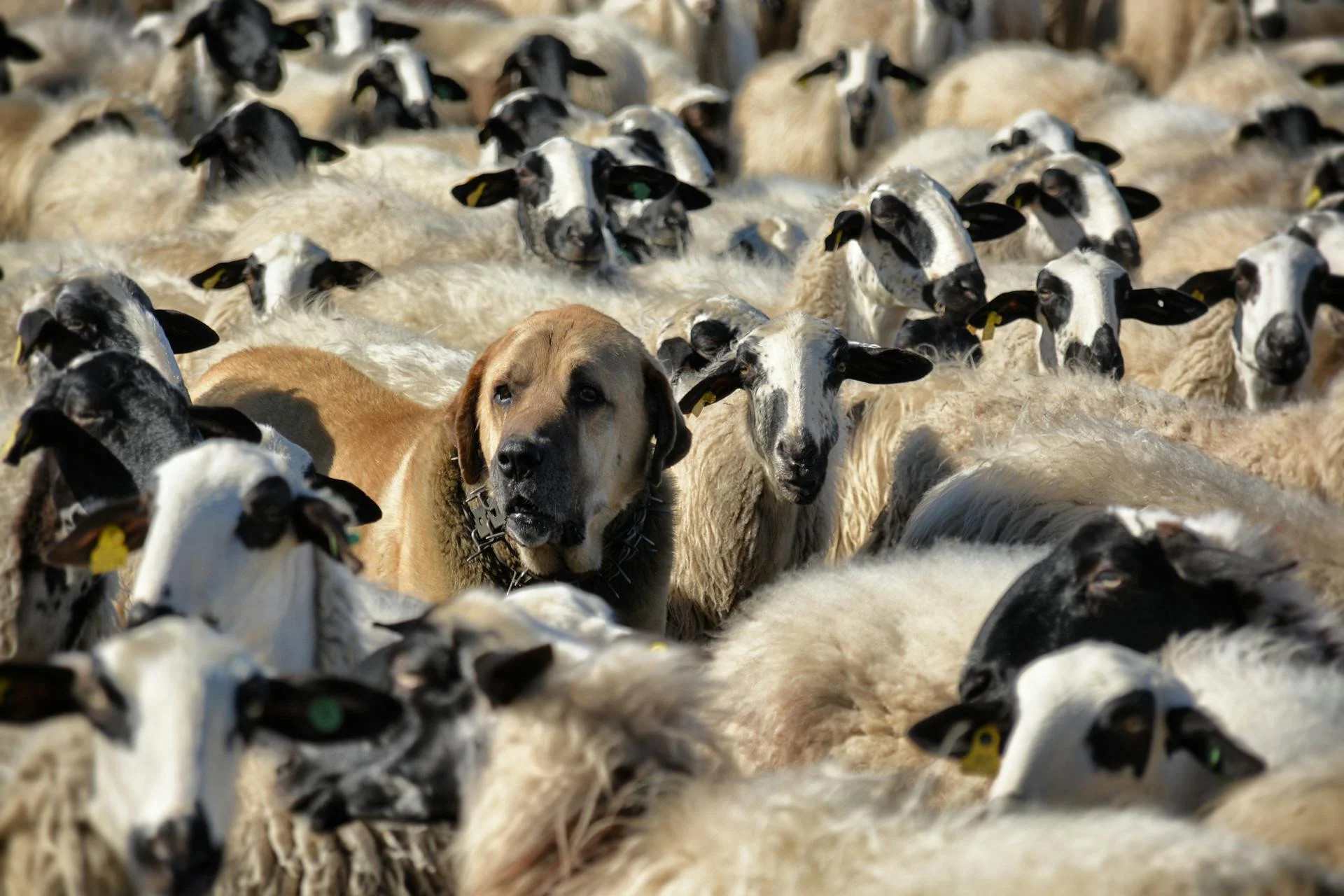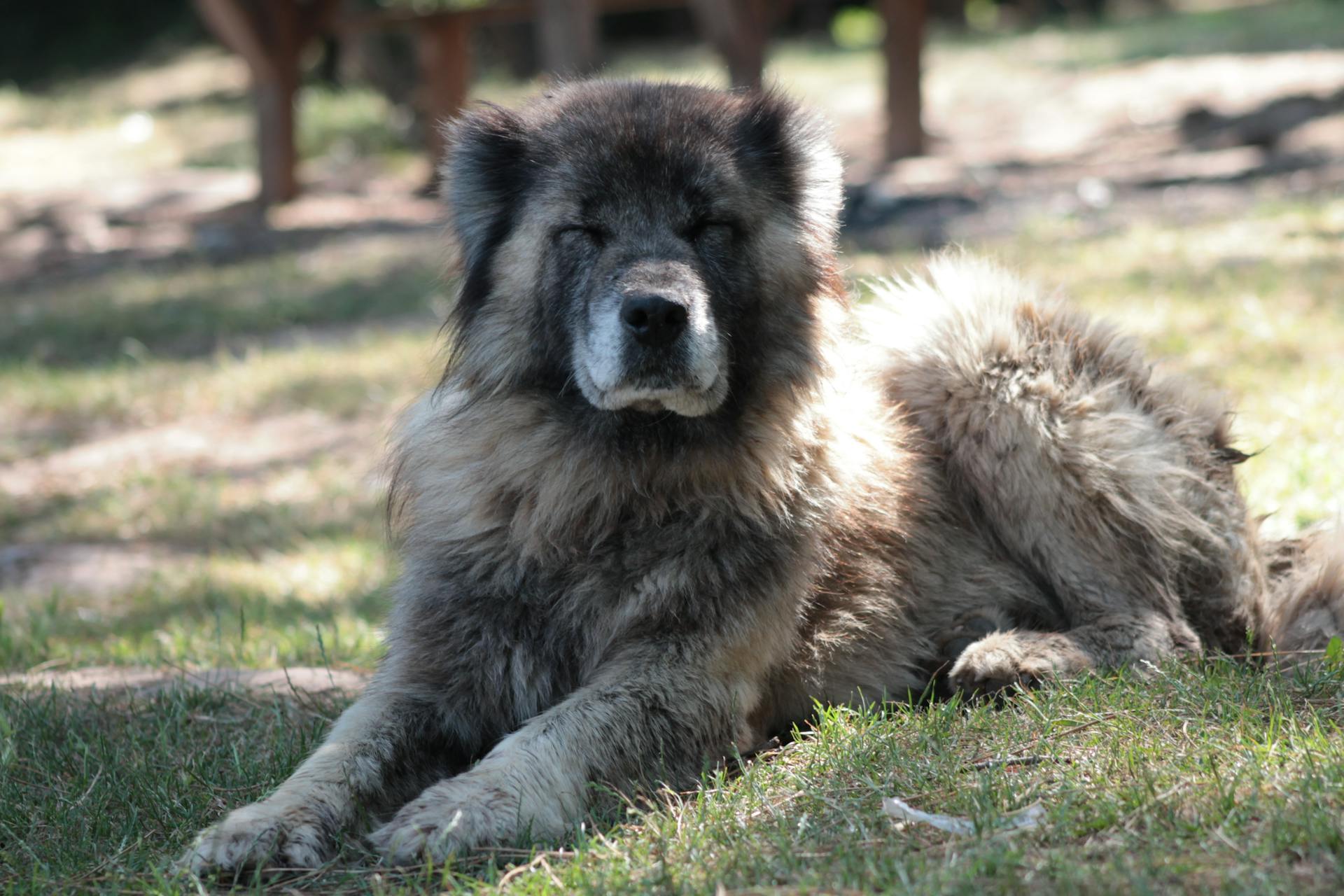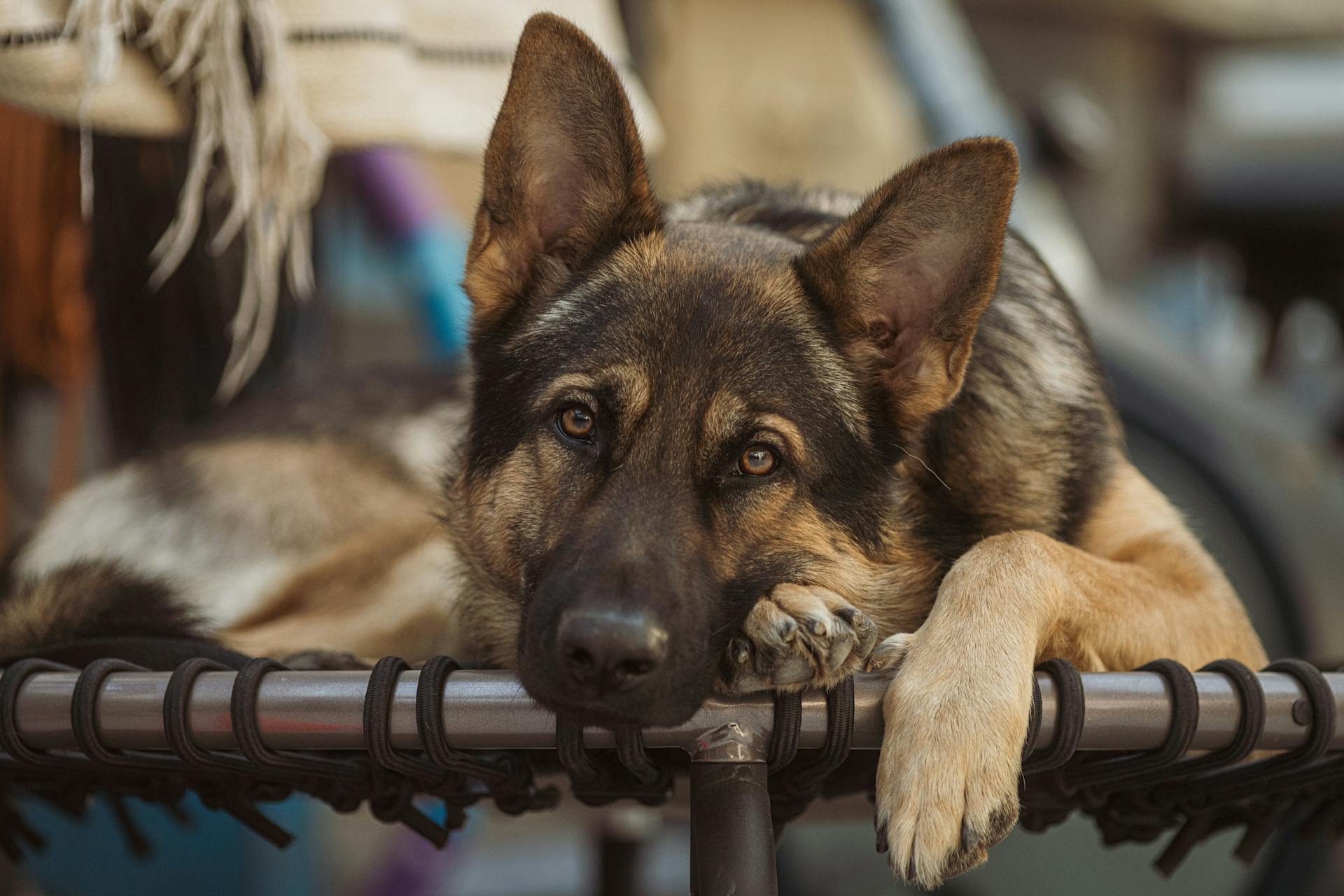
The Caucasian Shepherd is a sturdy breed with a strong build, but like any dog, it's not immune to health issues. Hip dysplasia is a common problem in the breed, which can lead to arthritis and mobility issues if left untreated.
Regular exercise can help prevent hip dysplasia, but it's essential to start slowly and gradually increase the intensity and duration. A daily walk of at least 30 minutes is a good starting point.
Caucasian Shepherds are also prone to eye problems, including cataracts and progressive retinal atrophy. These conditions can cause vision loss and blindness, so regular eye exams are crucial.
To keep your Caucasian Shepherd's eyes healthy, provide a balanced diet rich in omega-3 fatty acids and vitamins, and consider adding a supplement specifically formulated for eye health.
A fresh viewpoint: Are Mutts Healthier than Purebred Dogs
Health Issues
Caucasian Shepherd Dogs are generally healthy, but they can be prone to certain health issues. They have an average lifespan of 10-12 years.
Hip dysplasia is a common issue in large dog breeds, causing pain, swelling, and arthritis. It's essential to work with a veterinarian to develop a treatment plan that may include medication, exercise management, and surgery.
Heart problems can cause low energy, breathlessness, coughing, and even collapse in dogs. Monitoring, medication, and surgery are potential treatment options.
Cataracts can cause clouding of the eye, impacting a dog's vision. While cataracts can be removed if necessary, many dogs can live with them without a problem.
Obesity is a significant concern for Caucasian Shepherd Dogs, increasing the risk of various health issues. To prevent obesity, it's crucial to control their diet and exercise carefully.
Bloat is a medical emergency that requires immediate attention. To prevent bloat, feed your dog smaller portions and avoid exercising them before or after meals.
Here's a summary of the common health issues affecting Caucasian Shepherd Dogs:
Regular dental care, such as brushing your dog's teeth daily, can help prevent periodontal disease.
Care and Maintenance
Caucasian Shepherd dogs require regular grooming to stay on top of their shedding, which is a year-round process with two heavy shedding periods. Brushing their coat daily is essential to prevent knots and keep them looking their best.
Brushing their teeth at least twice a week can help maintain their good teeth, and cleaning their ears weekly can prevent infections. They also need their nails trimmed occasionally.
Caucasian Shepherds are high-energy dogs that require lots of exercise to stay happy and prevent obesity. Endurance activities like hiking are well-suited for this breed.
A consistent and high-quality diet is crucial for their health, and feeding them people food should be avoided. It's also essential to supervise them as you would a toddler, keeping doors closed and picking up after yourself to prevent them from getting into trouble.
Here are some key care and maintenance tips for your Caucasian Shepherd:
- Brush their coat daily to prevent knots and shedding.
- Brush their teeth at least twice a week.
- Clean their ears weekly.
- Trim their nails occasionally.
- Exercise them regularly, including endurance activities like hiking.
- Feed a consistent and high-quality diet.
- Supervise them as you would a toddler.
Care, Diet, and Exercise
Caucasian Shepherd dogs require regular exercise to stay happy and healthy. They need at least 90 minutes of exercise per day, which can include long walks, hikes, and interactive play like fetch and playing with frisbees.
For more insights, see: How Much Exercise Does a Cavapoo Need
To keep your dog's mind and body active, it's essential to provide a stimulating environment. This can be achieved by blocking off rooms as necessary and keeping doors closed to prevent your dog from getting into trouble.
Brushing your dog's coat and teeth regularly is crucial for their overall health. Caucasian Ovcharkas generally have good teeth, and you can keep them perfect by brushing them at least twice a week. Brushing their coat as needed, at least weekly, will also help prevent matting and tangling.
Due to their assertive nature and large size, Caucasian Shepherd dogs are not recommended for homes with small children. It's also essential to supervise your pet as you would a toddler and keep them away from objects they shouldn't put in their mouth.
Here is a summary of the daily care routine:
- Supervise your pet as you would a toddler
- Brush their coat as needed, at least weekly
- Clean their ears weekly, even as a puppy
- Brush their teeth at least twice a week
- Exercise them regularly, but don't overdo it at first
Consistency is key when it comes to your dog's diet. Feed a high-quality diet appropriate for their age, and avoid giving them people food. This will help prevent digestive issues and ensure they receive the nutrients they need to stay healthy.
General Health
Caucasian Shepherd Dogs have an average lifespan of 10 - 12 years. This is a good range, but it's essential to keep in mind that individual dogs can vary.
Hip dysplasia is a painful condition that affects large dog breeds, including Caucasian Shepherd Dogs. It's caused by the hip joints developing abnormally, leading to pain, swelling, and arthritis.
Treatment options for hip dysplasia include medication, exercise management, and surgery. If caught early, these treatments can significantly improve your dog's quality of life.
Heart problems can cause low energy, breathlessness, coughing, and sometimes collapse in dogs. Monitoring, medication, and surgery are potential treatment options.
Cataracts are the abnormal clouding of the eye, impacting a dog's vision. In many cases, cataracts can be removed if necessary, allowing your dog to maintain their vision.
Obesity is a significant health risk for Caucasian Shepherd Dogs, requiring careful control of diet and exercise. A healthy weight is crucial to preventing various health issues.
Bloat is a medical emergency that requires immediate attention if you notice your dog's belly is swollen. Feeding smaller portions and not exercising your dog immediately before or after eating can help prevent bloat.
Here's a list of common health issues affecting Caucasian Shepherd Dogs:
- Hip dysplasia
- Heart problems
- Cataracts
- Obesity
- Bloat
Emergencies

If you notice any of the following signs in your Caucasian Shepherd, seek medical care immediately. Scratching or shaking the head, tender ears, or ear discharge are all warning signs that require prompt attention.
Inability or straining to urinate, accompanied by discolored urine, is a serious issue that demands medical care right away.
Cloudiness, redness, itching, or any other abnormality involving the eyes can be a sign of a more serious health problem.
Dry heaving or a large, tight, painful abdomen can be a symptom of a range of issues, from gastrointestinal problems to more serious conditions.
General reluctance to run or play can be a sign that your dog is in pain or discomfort, and should not be ignored.
Leg stiffness, reluctance to rise, sit, use stairs, run, jump, or "bunny hopping" can be a sign of a serious health issue that requires immediate attention.
Here are the emergency signs to watch out for in your Caucasian Shepherd:
- Scratching or shaking the head, tender ears, or ear discharge
- Inability or straining to urinate; discolored urine
- Cloudiness, redness, itching, or any other abnormality involving the eyes
- Dry heaving or a large, tight, painful abdomen
- General reluctance to run or play
- Leg stiffness, reluctance to rise, sit, use stairs, run, jump, or “bunny hopping”
Specific Health Issues

Caucasian Shepherd Dogs are generally healthy, but like all breeds, they can be prone to certain health issues. One of the most common issues is hip dysplasia, a painful condition that can lead to arthritis.
Hip dysplasia is often seen in large dog breeds and can cause pain, swelling, and arthritis. Treatment options include medication, exercise management, and surgery.
Some Caucasian Shepherd Dogs may also be at risk for heart problems, which can cause low energy, breathlessness, coughing, and sometimes collapse. Treatment will depend on the specific heart problem, but monitoring, medication, and surgery are potential options.
Here are some common health issues that can affect Caucasian Shepherd Dogs:
Obesity is a significant concern for Caucasian Shepherd Dogs, as it can lead to a range of health problems. To prevent obesity, it's essential to control your dog's diet and exercise.
Infections
Caucasian Ovcharkas are susceptible to bacterial and viral infections, just like any other dog. These can include parvo, rabies, and distemper.
Many of these infections are preventable through vaccination, which will be recommended based on the diseases seen in your area, your dog's age, and other factors.
Some infections can be serious, so it's essential to be aware of the symptoms and know when to seek veterinary help.
The symptoms of infections can vary, but many diseases cause a characteristic combination of symptoms that can signal your dog needs help.
You might like: Papillon Dog Health Problems
Parasites
Parasites can invade your Ovcharka's body, inside and out, and can be a serious concern for everyone in the household.
Fleas and ticks can infest her skin and ears, while hookworms, roundworms, heartworms, and whipworms can get into her system through contaminated soil, unclean water, or an infected mosquito bite.
Some of these parasites can be transmitted to you or a family member, making regular testing and preventive medication crucial to keep your canine friend healthy.
Drinking unclean water or walking on contaminated soil can lead to hookworms, roundworms, and whipworms getting into your Ovcharka's system.
Suggestion: Caucasian Shepherd Breeders

These parasites can cause pain, discomfort, and even death in your dog, so it's essential to test for them on a regular basis.
Ear mites can also infest your Ovcharka's ears, causing discomfort and pain.
Regular testing and preventive medication can help prevent the transmission of these parasites to you or a family member.
Hip and Elbow Dysplasia
Hip and Elbow Dysplasia is a significant health concern for Caucasian Ovcharkas. Both hips and elbows are at risk for dysplasia, an inherited disease that causes the joints to develop improperly and results in arthritis.
Stiffness in your Ovcharka's elbows or hips may become a problem for him, especially as he matures. You may notice that he begins to show lameness in his legs or has difficulty getting up from lying down.
We can treat the arthritis—the sooner the better—to minimize discomfort and pain. We'll take X-rays of your dog's bones to identify issues as early as possible.
Surgery is sometimes a good option in severe and life-limiting cases. Keep in mind that overweight dogs may develop arthritis years earlier than those of normal weight, causing undue pain and suffering!
Here are some common signs of hip and elbow dysplasia:
- Lameness in legs
- Difficulty getting up from lying down
- Stiffness in elbows or hips
Regular check-ups with your veterinarian can help identify any potential issues early on, and prevent long-term damage.
Knee Problems
Caucasian Shepherd Dogs can be prone to knee problems, specifically patellar luxation, where the kneecap slips out of place. This can cause them to suddenly pick up a back leg and skip or hop for a few strides.
You might notice that your dog tries to pop the kneecap back in place by kicking their leg out sideways. If the problem is mild and involves only one leg, your friend may not require much treatment beyond arthritis medication.
However, if the symptoms are severe, surgery may be needed to realign the kneecap to keep it from popping out of place. This is a serious condition that requires veterinary attention.
Here are some common signs of patellar luxation:
- Sudden skipping or hopping
- Kicking the leg out sideways to pop the kneecap back in place
- Arthritis in the affected leg
If you suspect your dog has patellar luxation, it's essential to consult with a veterinarian for proper diagnosis and treatment.
Sources
- https://www.akc.org/dog-breeds/caucasian-shepherd-dog/
- https://www.thepethealthclinic.com/client-resources/breed-info/caucasian-owtcharka/
- https://www.puppies.co.uk/breeds/caucasian-shepherd-dog
- https://healthypawsvetclinic.com/breed-info-species/canine/caucasian-ovcharka/
- https://www.animalhealthcenternjwc.com/client-resources/breed-info/caucasian-owtcharka/
Featured Images: pexels.com

